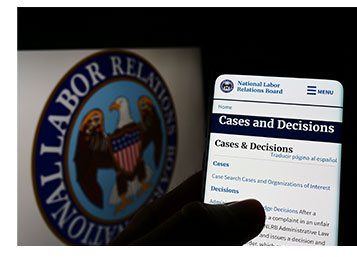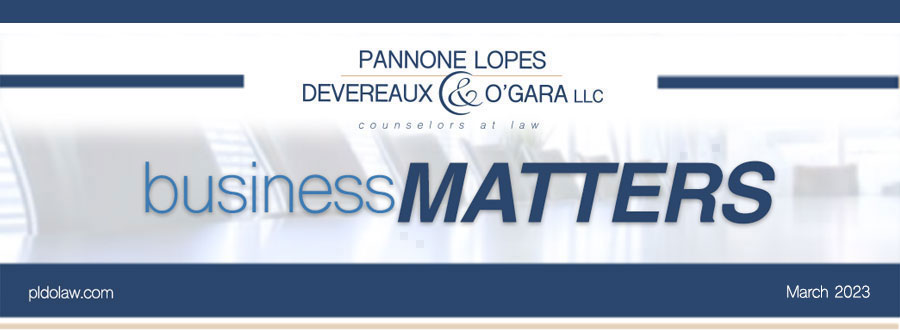THIS ISSUE'S HEADLINES
Major Ruling by NLRB Threatens Enforceability of Severance Agreements
First Circuit Explains FLSA Overtime Requirements for Administrative Employees
Protecting Minority Shareholders in a Closely Held Corporation
Stay Informed — PLDO COVID-19 Resource Library

MAJOR RULING BY NLRB THREATENS ENFORCEABILITY OF SEVERANCE AGREEMENTS
 In a recent decision that's bound to drastically impact the employment landscape, the National Labor Relations Board (NLRB) declared it illegal under federal law for companies to require an employee to keep the terms of their severance agreement confidential and to refrain from disparaging the former employer. The scope and breadth of the NLRB’s decision cannot be understated as it has become standard practice to include confidentiality and non-disparagement provisions in agreements in exchange for severance pay. In a recent decision that's bound to drastically impact the employment landscape, the National Labor Relations Board (NLRB) declared it illegal under federal law for companies to require an employee to keep the terms of their severance agreement confidential and to refrain from disparaging the former employer. The scope and breadth of the NLRB’s decision cannot be understated as it has become standard practice to include confidentiality and non-disparagement provisions in agreements in exchange for severance pay.
PLDO Partner Brian Lamoureux issued a Client Advisory last week summarizing the NLRB’s major ruling on severance agreements. While many questions remain, such as whether its ruling applies retroactively to existing agreements and whether employers can get around this ruling by, for example, putting in so-called “savings clause” language, employers should keep this ruling in mind as they navigate future termination and severance decisions. Furthermore, employers should also take a close look at their existing severance agreements and determine whether they contain either or both of the offending provisions above. And, if an employer currently has an offer of severance pending for consideration by a terminated employee, it should consult with counsel immediately on how to proceed in light of the NLRB’s ruling.
If you have questions or would like further information, contact Attorney Lamoureux, who is a member of the firm’s litigation, employment, corporate, and cybersecurity teams, at 401-824-5155 or email bjl@pldolaw.com.
[back to top]

FIRST CIRCUIT EXPLAINS FLSA OVERTIME REQUIREMENTS FOR ADMINISTRATIVE EMPLOYEES
 It is well settled that the Fair Labor Standards Act (“FLSA”) requires employers to pay certain employees overtime pay at one and one-half times the employees’ regular rate. 29 U.S.C.S. §207(a). However, certain employees are exempt from this overtime requirement, specifically employees in a bona fide executive, administrative, or professional capacity. That sounds simple enough, but as most employers are already aware, these classifications can be difficult to navigate in practice. It is well settled that the Fair Labor Standards Act (“FLSA”) requires employers to pay certain employees overtime pay at one and one-half times the employees’ regular rate. 29 U.S.C.S. §207(a). However, certain employees are exempt from this overtime requirement, specifically employees in a bona fide executive, administrative, or professional capacity. That sounds simple enough, but as most employers are already aware, these classifications can be difficult to navigate in practice.
A recent First Circuit case helped to resolve the murky precedent surrounding the test to determine which employees fit into the “administrative” exemption. Federal regulations have defined those working in an administrative capacity to include employees:
(1) Compensated on a salary or fee basis of $684 or more per week;
(2) Whose primary duty is the performance of office or non-manual work directly related to the management or general business operations of the employer or the employer’s customers; and
(3) Whose primary duty include the exercise of discretion and independent judgment with respect to matters of significance.
29 C.F.R. §541.200.
In Walsh v. Unitil Serv. Corp., 57 F.4th 353 (1st Cir., 2023), the First Circuit discussed the second prong of the above analysis. The court opined that the central question is a “relational” one which “considers the relationship between the job duties of the roles in question and the business purposes of the employer or its customers.” Id. at 358. The relevant questions are twofold: “(1) whether the employee’s role relates to ‘running or servicing the business,’ and if so, (2) what the scope or ‘generality’ of the employee’s role is.” Id. at 359. The “employee’s duties must rise to a level of generality beyond responsibility for day-to-day tasks in order to satisfy” the second prong of the administrative exemption. Id. at 361.
In Walsh, Unitil Service Corporation was engaged in the business of providing electrical and gas services to its customers. Because the employees’ primary duties – “to operate and monitor their respective electrical grids and gas pipelines for the [subsidiaries]” – were directly “related to Unitil Service’s business purpose, the second prong of the ‘administrative’ exemption is not satisfied” and the employees were not exempt from overtime pay requirements. Id. at 363. As many employers are already aware, it is critical to understand how to properly determine whether an employee is exempt from FLSA overtime requirements.
For more information on this topic, please contact PLDO Attorney Paige E. Macnie at pmacnie@pldolaw.com.
[back to top]

PROTECTING MINORITY SHAREHOLDERS IN A CLOSELY HELD CORPORATION
 The directors and majority shareholders in a closely held business have a fiduciary duty to the company and to all shareholders, including its minority shareholders. Their duty requires them to always act in the best interests of the company and in compliance with the company’s corporate governance policies, as well as applicable laws. When majority shareholders act in a manner that unfairly prejudices the minority shareholders, the minority shareholder may have a claim of oppression. The directors and majority shareholders in a closely held business have a fiduciary duty to the company and to all shareholders, including its minority shareholders. Their duty requires them to always act in the best interests of the company and in compliance with the company’s corporate governance policies, as well as applicable laws. When majority shareholders act in a manner that unfairly prejudices the minority shareholders, the minority shareholder may have a claim of oppression.
In an Advisory entitled “Protecting Minority Shareholders in a Closely Held Corporation,” PLDO Managing Principal Gary R. Pannone provides examples of how majority stakeholders can breach their fiduciary duties and offers guidance on how minority shareholders can protect themselves by understanding and exercising their contractual rights, addressing key issues in advance, and pursuing legal remedies to hold majority stakeholders accountable if they breach any covenants under the shareholder agreement or statutory law.
It is critically important that anyone deciding to invest in a closely held business consider the risk of being taken advantage of by the majority shareholders before acquiring a minority shareholder position. If you have questions regarding closely-held corporations or any other business legal matters, please contact PLDO Managing Principal Gary R. Pannone at 401-824-5100 or email gpannone@pldolaw.com.
[back to top]

 STAY INFORMED – PLDO COVID-19 RESOURCE LIBRARY STAY INFORMED – PLDO COVID-19 RESOURCE LIBRARY
PLDO’s team of attorneys continue to add updates and advisories regarding the pandemic and its impact on families, businesses and organizations. To access our COVID-19 Resource Library, click here.
[back to top]
|




 In a recent decision that's bound to drastically impact the employment landscape, the National Labor Relations Board (NLRB) declared it illegal under federal law for companies to require an employee to keep the terms of their severance agreement confidential and to refrain from disparaging the former employer. The scope and breadth of the NLRB’s decision cannot be understated as it has become standard practice to include confidentiality and non-disparagement provisions in agreements in exchange for severance pay.
In a recent decision that's bound to drastically impact the employment landscape, the National Labor Relations Board (NLRB) declared it illegal under federal law for companies to require an employee to keep the terms of their severance agreement confidential and to refrain from disparaging the former employer. The scope and breadth of the NLRB’s decision cannot be understated as it has become standard practice to include confidentiality and non-disparagement provisions in agreements in exchange for severance pay. It is well settled that the Fair Labor Standards Act (“FLSA”) requires employers to pay certain employees overtime pay at one and one-half times the employees’ regular rate. 29 U.S.C.S. §207(a). However, certain employees are exempt from this overtime requirement, specifically employees in a bona fide executive, administrative, or professional capacity. That sounds simple enough, but as most employers are already aware, these classifications can be difficult to navigate in practice.
It is well settled that the Fair Labor Standards Act (“FLSA”) requires employers to pay certain employees overtime pay at one and one-half times the employees’ regular rate. 29 U.S.C.S. §207(a). However, certain employees are exempt from this overtime requirement, specifically employees in a bona fide executive, administrative, or professional capacity. That sounds simple enough, but as most employers are already aware, these classifications can be difficult to navigate in practice.  The directors and majority shareholders in a closely held business have a fiduciary duty to the company and to all shareholders, including its minority shareholders. Their duty requires them to always act in the best interests of the company and in compliance with the company’s corporate governance policies, as well as applicable laws. When majority shareholders act in a manner that unfairly prejudices the minority shareholders, the minority shareholder may have a claim of oppression.
The directors and majority shareholders in a closely held business have a fiduciary duty to the company and to all shareholders, including its minority shareholders. Their duty requires them to always act in the best interests of the company and in compliance with the company’s corporate governance policies, as well as applicable laws. When majority shareholders act in a manner that unfairly prejudices the minority shareholders, the minority shareholder may have a claim of oppression.